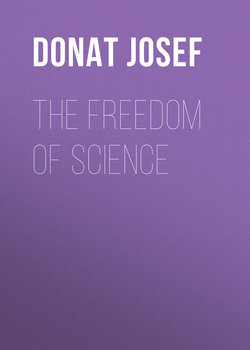Читать книгу The Freedom of Science - Donat Josef - Страница 6
First Section. The Freedom of Science and its Philosophical Basis
Chapter II. Two Views Of The World And Their Freedom
ОглавлениеThere can, then, be no difference of opinion on this matter among sober-minded men: science must be free from all unjust hindrances and restraint. But we have not yet finished. We have not even proceeded very far on our way. The further question at once presents itself: Which are those unjust hindrances and restraints that scientific research and teaching may reject? May there not perhaps be such which it must respect? There is little meaning in the cry: Freedom! Freedom! This attractive word, which always finds an enthusiastic echo in man, may easily prove a misleading catchword, and become a dangerous weapon of the thoughtless and the unscrupulous.
The question is not, whether our science, or, to speak more generally, our intellectual life, must be free – of that there can be no doubt. No life can spring up and thrive without due freedom. The question is: What sort of freedom? how can it be more precisely defined? We all, indeed, demand freedom for the citizen; but what kind of freedom? He should be free from the fetters of tyranny and despotism. Do we also demand that he be free from the laws of the state? By no means! On the contrary, he must be subject to these, for the very reason that he is a citizen and not the inhabitant of an uncivilized world. We demand freedom for the artist; he should not be bound by the tyranny of fashion. Do we also demand that he be exempt from the laws of beauty and art? Not at all. He must subject himself to these if he means to be an artist and not a quack. That would not be true freedom, but lawlessness and license, the privilege of barbarism. Freedom therefore is a very ambiguous word.
There are two kinds of freedom, lawful and unlawful: the latter is freedom from just laws, the former from unjust laws.
We ask again, what is that lawful freedom which man may claim for his scientific activity? In other words, what are the restraints which he may reject as unjust, and as enslaving the mind? – Here the ways part. Here, too, our question goes deeper, and touches something which moves men's minds very powerfully. Two different views of the world, two opposite conceptions of man and his thought, come here in collision.
